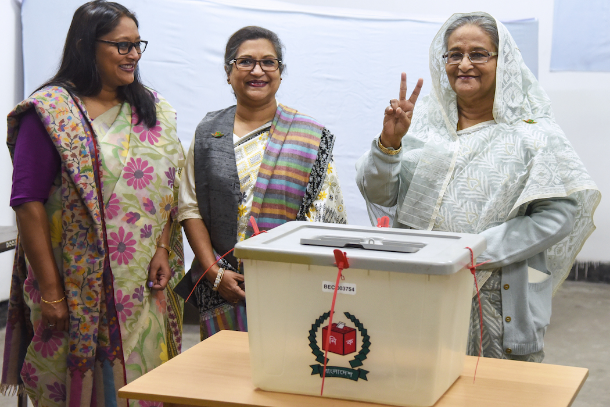Hasina reportedly plans to meet with other political parties as some refuse to accept results of ‘farcical’ election

Bangladeshi Prime Minister Sheikh Hasina (right) flashes the victory symbol after casting her vote, as her daughter Saima Wazed Hossain (first left) and her sister Sheikh Rehana (second left) look on at a polling station in Dhaka on Dec. 30. (Photo by AFP)Stephan Uttom and Rock Rozario, Dhaka
Bangladesh
January 17, 2019 Bangladesh Prime Minister Sheikh Hasina is to hold dialogue with all major parties in an apparent move to end the political impasse and combat criticism over irregularities and outbreaks of violence during the recent general election.
Hasina’s Awami League-led Grand Alliance secured 288 out of 299 parliamentary seats that were up for grabs on Dec. 30, making it a record third consecutive win for the alliance.
The Awami League (AL) alone won 257 seats.
Jatiya Oikya Front (National Unity Front), the opposition alliance led by the Bangladesh Nationalist Party (BNP), secured only eight seats.
Local media reported anomalies during the poll relating to the stamping of ballot papers, ballot-box stuffing, and the intimidation of opposition candidates and supporters by ruling party supporters across the country.
Some 17 people, mostly political activists, were killed and dozens more injured in clashes that occurred on the day of the election. Most of the casualties were reportedly affiliated with either the AL or BNP
The BNP and its allies rejected the results and termed the election “farcical and rigged.” They called for another poll.
Newly elected parliamentarians from the ruling alliance took oaths on Jan. 3, but opposition MPs refrained from following suit.
Despite the relatively calm political landscape that has emerged in the wake of the election, the AL is still taking flak both at home and abroad over the way the it was handled and what transpired.

A man casts his vote at a polling station in Dhaka on Dec. 30. (Photo by ucanews.com)
To help settle matters, Prime Minister Hasina plans to invite all of the political parties for talks, H.T. Imam, her political affairs adviser, told the media in Dhaka on Jan. 15.
Imam reiterated an earlier call from AL secretary general Obaidul Quader for more dialogue between political parties.
BNP secretary general Mirza Fakhrul Islam Alamgir said the party would only consider joining talks if they included as an agenda item the “cancelation of the Dec. 30 election” and “a fresh election.”
H.T. Imam termed the BNP’s demands for a fresh election “unrealistic” and “devoid of reality,” and called on the party to support the new government.
Imam’s remarks came on the same day that Transparency International Bangladesh (TIB), a country chapter of the Berlin-based global anti-graft watchdog, published a study revealing there were indeed huge irregularities during the election.
The study found that ballot-box stuffing had marred the results of 47 out of the 50 seats surveyed, with polling stations “captured” the night before ballots were cast.
Other problems cited in the report include inaction on the part of those supposed to be enforcing the law, voters barred from entering polling stations, people being forced to vote for candidates of the ruling party, and polling agents of opposition parties being forcibly driven away.
Addressing a press conference in Dhaka, TIB executive director Iftekharuzzaman described the election as being “partially participatory, non-competitive, questionable and faulty.”
He called for a judicial probe, The Daily Star reported on Jan. 16.

Bangladeshi security personnel carry polling materials at a distributing center in Dhaka on Dec. 29. (Photo by Munir Uz Zaman/AFP)
One day earlier, The New York Times published an editorial criticizing what it termed “Bangladesh’s farcical election.”
Analysts and activists generally welcomed the news of the planned talks but were skeptical about what results they would produce.
“There were talks before the election, but they bore no fruit,” Father Anthony Sen, a member of the Bangladeshi bishops’ Commission for Justice and Peace, told ucanews.com.
“So we had an election that didn’t bring good news for our democracy. The opposition parties have rejected the results, and there are reasons to doubt why they should decide to sit for talks, as it otherwise means accepting defeat for them,” he said.
“However, if this dialogue ever happens, the focus should be on ending political discord and working together for the welfare of the people,” he added. “Dialogue must lead to peace and development, not to more discord and clashes.”
Then again, the call for dialogue may just be window-dressing, according to Dr. Shantunu Majumder, an associate professor of political science at Dhaka University.
“Opposition parties have found themselves cornered after the election, so the government is relatively relaxed, and it seems it could back down in the face of any pressure in relation to the election,” he said.
“The call for dialogue might be a political gesture to show people both at home and abroad that everything is just fine.”
